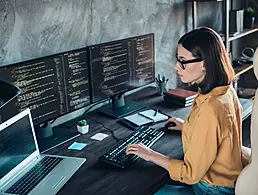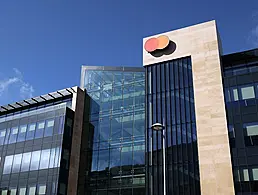Approaches to wellness and diversity at work in the future will focus on more than ‘uncomfortable bean bags’ in the office, writes Mastercard’s Sarah Cunningham.
The past few months have not been easy for anyone and it can be hard to see positives during a time of such national and global tragedy. But as we look back on the changes we’ve already gone through, it also raises questions for the future of work. We must learn from these lessons.
When we look to the horizon, to a post-Covid world, companies won’t go back to the same 2019 operating model. Here are just five ways in which I believe the period of history we are all living through will ultimately have a positive impact on the future of work.
1. Innovation accelerated
David Epstein, the author of the book ‘Range: Why Generalists Triumph in a Specialized World’, said “companies do their most impactful creative work in a crisis, because the disciplinary boundaries fly out the window”.
When I look at the technology industry and the world in general, I am astounded and awestruck by some of the solutions produced at speed during these turbulent times. The pandemic has shown that necessity truly is the mother of invention and that through collaboration, support and focus, so much more is possible.
Within the technology industry, we’ve seen rapid advances in everything from augmented-reality collaboration tools to enhanced air-purification systems and advances in contactless providing consumers with safer, physically distanced digital payments.
The world is still navigating its way through a storm and it may be some time before we hear of or experience all the innovations that are being conceived today. But one thing is certain: the coming years will see industries progress rapidly as innovation is revved up to warp speed.
2. Wellness as the cornerstone
We’ve all become more aware of our own physical health, mental health and even our financial health. And it’s not just individuals; companies across the globe are investing in much-fneeded wellness initiatives for their employees.
Employers recognise that they need to support employees with empathy and understanding. Fitness classes have moved online, wellness talks have become virtual and the range of wellness offerings has increased across the board.
But this holistic focus on ‘the whole you’ is not just relevant during a pandemic. It is imperative that an integrated employee wellness strategy becomes the cornerstone of any future work environment.
Sarah Cunningham. Image: Mastercard
3. Leadership with empathy and humanity
I’ve noticed that the most effective leaders, particularly over these past few months, are those who possess the uniquely human skills of empathy, trust and integrity. Leaders with these skills create a culture of psychological safety, where employees feel empowered to speak up and share their ideas. They are not just leaders; they are coaches and advocates who instil their teams with the confidence and opportunity to shine, even in the darkest of times.
The most successful leaders also possess one other crucial skill essential for the future of work: adaptability. As our world has turned on its head, we have all had to adapt to new ways of working.
Managers have had to learn how to effectively manage, coach and onboard teams in a virtual world. Leaders have had to react fast and pivot their strategy. Favourite projects have been retired while new and innovative projects have been borne out of necessity. Change has been relentless and adaptability has never been so essential for success.
Looking to the future, as technological advances continue apace, employers will seek these uniquely human skills when they hire not only for their leaders, but for all roles.
4. Destination office as the linchpin to a hybrid world
With the exception of critical workers, most technology employees were mandated to work from home when the crisis hit. Some found this suited them; they saved time on commuting and those with space for a quiet home office found it conducive to focused work.
But for every person who celebrated home working, there was another who lamented it. Many who live alone struggled with isolation while others who live in bustling flat-shares found it hard to find quiet time. What became crystal clear, though, is that we are all different and we all require different work environments at different times to be at our best. In short, we require choice.
That’s why my personal view is that the future of work will be hybrid. Choice and flexibility will form the foundation and technology will be the enabler. And the office environment itself will still have a pivotal role to play.
‘The pandemic has shown that necessity truly is the mother of invention’
The office of the future will be a positive, inspiring and uplifting physical space that promotes continuous learning, nurtures wellness, strengthens community, enhances culture and fosters creativity, co-creation and innovation.
Every aspect of the office will be thoughtfully planned to meet the holistic needs of employees. The choice of materials selected in the interior fit-out will be naturally antibacterial and technology will become part of the fabric of the building to create contactless experiences for everything, from registering visitors to calling the lift and ordering and collecting food.
Within meeting rooms and collaboration areas, technology will work harder to bridge the physical and virtual worlds in a bid to create consistent immersive experiences, both within and away from the office. Indeed, creating an inclusive and equitable environment will be a design imperative. Gone will be the days of loud, bright primary colours and uncomfortable bean bags, replaced instead by a calming decor based on wellness design principles that cater to new and diverse pools of talent.
5. A culture of belonging
There is a well-known saying that goes: ‘Diversity is being invited to the party, inclusion is being asked to dance.’ I would continue that saying to add that belonging is feeling free to be yourself when you dance. It is my view that belonging must come first. After all, you need to see that you belong before you feel you can start to dance freely.
And to see that you belong in the workplace, you need to see leadership with empathy and humanity setting an example and leading from the front. You need to see a culture of psychological safety where the holistic wellness needs of employees are prioritised. You need to see true innovation, where diversity is not only celebrated but exists at the core. And you need to see an operating model founded on the principles of choice, flexibility and respect.
As leaders and future leaders, we can all play our part in taking the lessons from this turbulent period, using them to shape a more positive future of work; a future of innovation, empathy, humanity, choice, flexibility and, perhaps most importantly, belonging.
Take the opportunities as they come
These changes will open up new and untapped talent pools for technology companies of the future, from carers and parents seeking to work part-time to experienced candidates looking to get their foot back in the door following a career break. And from talent living in remote or rural parts of the country to those with physical disabilities or on the neurodiversity spectrum previously excluded from the workforce.
Opportunities abound; it’s your job to take them.
Sarah Cunningham is vice-president at Mastercard’s Technology Hub in Dublin.




